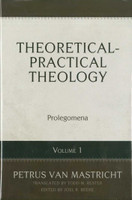
Van Mastricht, Petrus
“Theology is most correctly defined as the doctrine of living for God through Christ.”
—Petrus van Mastricht”
Petrus van Mastricht’s Theoretical-Practical Theology presents one of the most comprehensive studies of Christian doctrine ever penned. Freshly translated from the original Latin by Dr. Todd M. Rester, van Mastricht's masterwork presents a theological system committed to Scripture as the foundational and final authority, the classic Trinitarian and Christological formulas of Western Christianity, the Reformed confessions and covenant theology, and a vibrant emphasis on practical preaching. Van Mastricht treats every theological topic using what he calls "the best method of preaching:"
In many ways, van Mastricht remains unsurpassed in his rigorous, scholastic, and pastoral treatment of Reformed theology. Whether you are a student, pastor, or scholar, you will find a valuable model for moving from the text of Scripture to doctrinal formulation that edifies the people of God.
Volumes included in this set:
Theoretical-Practical Theology, Volume 1: Prolegomena
Van Mastricht addresses the nature of theology, laying out his method and establishing Scripture as the only infallible source and foundation for knowing God. This volume also includes van Mastricht’s homiletical aid, “The Best Method of Preaching,” as well as a biographical sketch by Adriaan Neele.
Theoretical-Practical Theology, Volume 2: Faith in the Triune God
Van Mastricht presents a robust, classical Doctrine of God in three main divisions: the existence of God and our knowledge of him, the names and attributes of God, and the Trinitarian nature of the one God who subsists in three persons, tied together with a penetrating definition of saving faith.
Theoretical-Practical Theology, Volume 3: The Works of God and the Fall of Man
Van Mastricht moves on to discuss the origins of the created order and sin. Building on the foundation of God's character, van Mastricht expounds on God's sovereign decrees and providential work in Creation. He then concludes by recounting Adam's fall and the devastating effects of sin on man and all of God's creation.
Theoretical-Practical Theology, Volume 4: Redemption in Christ
Against the backdrop of man's apostasy, van Mastricht presents a glorious explication of God’s great work of obtaining redemption through our Mediator, Jesus Christ. Mastricht sets the stage with a discussion about the covenant of grace before turning to the glorious Procurer of salvation. Mastricht walks us through the dignity, names, person, offices, states, and redemptive accomplishment of Jesus Christ.
Theoretical-Practical Theology, Volume 5: The Application of Redemption and the Church
In Volume 5: The Application of Redemption and the Church, van Mastricht examines how the Spirit applies Christ's work on the cross to His covenant people—in calling, regeneration, conversion, union with Christ, justification, adoption, sanctification, and glorification. He follows this with a thorough discussion of Reformed ecclesiology, treating the nature of the church, its ministers, its sacraments, church discipline, and church governance. This volume helps us remember the glorious link between soteriology and ecclesiology in the midst of an individualistic age.
Endorsements
". . . take Mastricht for divinity in general, doctrine, practice, and controversy, or as an universal system of divinity; and it is much better than Turretin or any other book in the world, excepting the Bible, in my opinion.”
—Jonathan Edwards
". . . a great gift to the Christian church as a whole, and to students, pastors, and scholars in particular.”
—Sinclair B. Ferguson, Chancellor’s Professor of Systematic Theology, Reformed Theological Seminary; and teaching fellow, Ligonier Ministries
“Van Mastricht is one of the greatest of the Reformed orthodox. . . His grasp of the tradition, his ability to interact with contemporary issues, and his careful articulation of orthodoxy exemplify the best of Protestant theology after the Reformation.”
—Carl R. Trueman, professor of biblical and religious studies, Grove City College
“Any serious student of Reformed theology needs to sit at the feet of Petrus van Mastricht."
—Stephen J. Nichols, president of Reformation Bible College and chief academic officer of Ligonier Ministries
“A new appreciation has grown in our time for the great post-Reformation theologians of the Reformed tradition, and Petrus van Mastricht was a towering giant among them."
—Ligon Duncan, chancellor and CEO, John E. Richards Professor of Systematic and Historical Theology, Reformed Theological Seminary
About the Authors and Editors
Petrus van Mastricht (1630–1706) was a Dutch theologian who studied at Utrecht under Gisbertus Voetius and Johannes Hoornbeeck. He pastored churches in the Netherlands and taught at the universities of Duisburg and Utrecht. His Theoretical-Practical Theology was praised by many as one of the great works of systematic theology and is noted for treating Christian doctrine comprehensively from its exegetical foundations to its practical use for one’s soul.
Dr. Todd Rester (PhD, Calvin Theological Seminary) is associate professor of church history at Westminster Theological Seminary. He also works as a translator for the Dutch Reformed Translation Society.
Joel R. Beeke is president and professor of systematic theology and homiletics at Puritan Reformed Theological Seminary, and a pastor of the Heritage Reformed Congregation in Grand Rapids, Michigan.